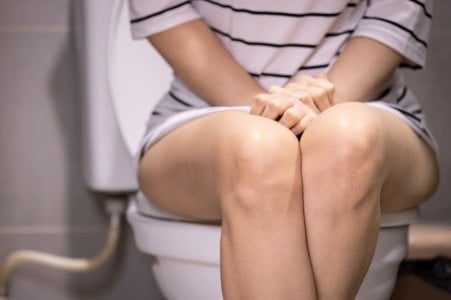Answer this one question urologists ask to spot major warning signs in your bladder
By
Seia Ibanez
- Replies 20
Disclaimer: This article cannot be considered medical advice. Remember to consult with your doctor for a more accurate diagnosis.
Our bodies undergo various changes as we age, and it's crucial to stay vigilant about our health.
One area that often gets overlooked is bladder health, which is why urologists play a vital role in helping us maintain our well-being.
A leading urologist has shared the one question he always asks his patients to uncover potential issues with their bladder: 'Is your bladder being nice to you?'
This simple yet profound question, posed by Dr Yaniv Larish, served as a conversation starter about bladder health and can reveal much about a person's urinary habits.
It might catch some off guard, but it opens the door to discussing frequency, sensation, and appearance—all key indicators of bladder function.
According to Dr Larish, there is no normal or ‘magic number’ for how often you should urinate.
'I think that the question is not, "How often are you [urinating]?" it's more, "Are you hydrated enough or overly hydrated?" and what is the point at which everything is sort of normal?' he said on Am I Doing it Wrong? podcast.
He also said the focus should be on the ease and comfort of your urinary experience.
‘You will know [that everything is working correctly] if it's coming out easily, if it all comes out in one shot very quickly and then stops. We don't want to see hesitation before it comes out,' he said.
'We don't want to see a prolonged standing time where you're just sort of there...And at the end, we don't want to be dribbling after or having the urge to [urinate] two seconds after we [urinated].'
He added that what people see when they look into the toilet after urinating can strongly indicate if their bladder is healthy and functioning.
But what are the red flags to watch out for?
Blood in the urine is a significant warning sign. It could indicate a kidney stone in younger individuals or something more serious, like cancer, in older adults.
Additionally, Dr Larish said the presence of what looks like mucus, sand, or gravel in the toilet bowl could also signal a developing kidney stone.
Another less obvious sign of a potential problem is passing gas while urinating.
If you find yourself needing to engage your abdominal muscles to complete urination, Dr Larish said it’s time to seek medical evaluation.
Dr Larish's golden rule is that you should be ‘thinking about nothing’ when urinating.
If you're suddenly waking up multiple times at night to urinate, it's essential to consult a doctor.
But did you know that you can achieve a full night’s sleep without interruptions of urinating at night?
A doctor shared three tips to urinate from two times at night to one time at night.
While it may not be true for everybody, ‘it certainly encourages people to do simple things without doing polypharmacy’. You can read more about it here.

What do you think of Dr Larish’s tips? Have you ensured your bladder is ‘being nice’ to you? Let us know in the comments below!
Our bodies undergo various changes as we age, and it's crucial to stay vigilant about our health.
One area that often gets overlooked is bladder health, which is why urologists play a vital role in helping us maintain our well-being.
A leading urologist has shared the one question he always asks his patients to uncover potential issues with their bladder: 'Is your bladder being nice to you?'
This simple yet profound question, posed by Dr Yaniv Larish, served as a conversation starter about bladder health and can reveal much about a person's urinary habits.
It might catch some off guard, but it opens the door to discussing frequency, sensation, and appearance—all key indicators of bladder function.
According to Dr Larish, there is no normal or ‘magic number’ for how often you should urinate.
'I think that the question is not, "How often are you [urinating]?" it's more, "Are you hydrated enough or overly hydrated?" and what is the point at which everything is sort of normal?' he said on Am I Doing it Wrong? podcast.
He also said the focus should be on the ease and comfort of your urinary experience.
‘You will know [that everything is working correctly] if it's coming out easily, if it all comes out in one shot very quickly and then stops. We don't want to see hesitation before it comes out,' he said.
'We don't want to see a prolonged standing time where you're just sort of there...And at the end, we don't want to be dribbling after or having the urge to [urinate] two seconds after we [urinated].'
He added that what people see when they look into the toilet after urinating can strongly indicate if their bladder is healthy and functioning.
But what are the red flags to watch out for?
Blood in the urine is a significant warning sign. It could indicate a kidney stone in younger individuals or something more serious, like cancer, in older adults.
Additionally, Dr Larish said the presence of what looks like mucus, sand, or gravel in the toilet bowl could also signal a developing kidney stone.
Another less obvious sign of a potential problem is passing gas while urinating.
If you find yourself needing to engage your abdominal muscles to complete urination, Dr Larish said it’s time to seek medical evaluation.
Dr Larish's golden rule is that you should be ‘thinking about nothing’ when urinating.
If you're suddenly waking up multiple times at night to urinate, it's essential to consult a doctor.
But did you know that you can achieve a full night’s sleep without interruptions of urinating at night?
A doctor shared three tips to urinate from two times at night to one time at night.
While it may not be true for everybody, ‘it certainly encourages people to do simple things without doing polypharmacy’. You can read more about it here.
Key Takeaways
- A leading urologist always asks his patients if their bladders are 'being nice' to them to gauge their bladder health and toilet habits.
- Dr Yaniv Larish emphasises no 'magic number' for how often one should urinate each day, but proper hydration and ease of urination are key indicators of bladder health.
- Blood in urine and other visual red flags, such as mucus or materials that resemble sand or gravel, can be signs of serious issues like kidney stones or cancer.
- Dr Larish's golden rule is that urinating should be a thoughtless process, and changes in bladder behaviour, such as sudden night-time urination, may indicate that it's time to consult a doctor.









